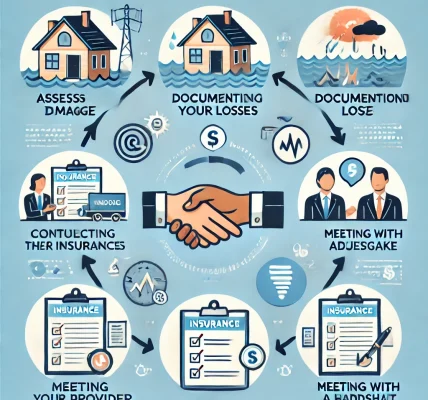When you file an insurance claim, one of the key figures you will interact with is an insurance adjuster. This professional plays a crucial role in determining the outcome of your claim, including how much compensation you will receive. Understanding their responsibilities, how they assess claims, and how to work with them effectively can make a big difference in your claim settlement experience.
This DIY guide will walk you through the role of an insurance adjuster, the claims process, and tips to ensure a smooth experience.
1. Who Is an Insurance Adjuster?
An insurance adjuster is a professional employed by an insurance company (or an independent firm) to evaluate claims. Their primary role is to investigate, assess, and determine the payout for insurance claims.
Types of Insurance Adjusters:
- Company Adjusters – Employed by insurance companies to assess claims from their policyholders.
- Independent Adjusters – Hired by insurance companies on a contract basis to evaluate claims.
- Public Adjusters – Hired by policyholders (not the insurance company) to negotiate better claim settlements.
2. What Does an Insurance Adjuster Do?
Insurance adjusters handle a variety of tasks to ensure claims are processed correctly. Here’s a breakdown of their main responsibilities:
A. Investigating Claims
- Inspecting the damage (property, vehicle, medical expenses, etc.).
- Interviewing claimants, witnesses, and relevant parties.
- Gathering documents such as police reports, medical records, and repair estimates.
B. Evaluating Coverage
- Reviewing the insurance policy to determine what is covered.
- Checking for exclusions, limits, and deductibles.
- Assessing whether the claim meets policy requirements.
C. Estimating Damages and Costs
- Calculating repair or replacement costs.
- Consulting with experts like contractors, medical professionals, or mechanics.
- Determining liability in cases of property damage or personal injury.
D. Negotiating Settlements
- Making an initial offer based on their assessment.
- Discussing terms with the policyholder or their legal representatives.
- Resolving disputes if the claimant disagrees with the settlement offer.
E. Finalizing the Claim
- Approving or denying claims based on findings.
- Issuing payments to claimants or third parties.
- Closing the claim once all conditions are met.
3. How to Work Effectively with an Insurance Adjuster
While adjusters work for insurance companies, you can take steps to ensure a fair claim settlement.
A. Be Prepared
✔ Gather all necessary documentation, such as photos, receipts, and repair estimates. ✔ Understand your policy coverage, limits, and exclusions. ✔ Maintain a record of all conversations and correspondence with the adjuster.
B. Cooperate but Be Cautious
✔ Answer questions honestly and provide requested information. ✔ Avoid giving unnecessary details that may be used against your claim. ✔ Be wary of quick settlement offers that seem too low.
C. Request a Second Opinion if Needed
✔ Get independent repair estimates to compare with the adjuster’s assessment. ✔ Consult a public adjuster or an attorney if you feel the settlement is unfair. ✔ Appeal the decision if you believe your claim was undervalued or wrongfully denied.
4. Common Challenges with Insurance Adjusters
Although many adjusters work ethically, some challenges may arise:
A. Low Settlement Offers
- Insurance companies aim to minimize payouts.
- You have the right to negotiate for a better settlement.
B. Delayed Claims Processing
- Some insurers may take longer than expected to process claims.
- Follow up regularly and keep detailed records of communication.
C. Disputes Over Coverage
- If the adjuster disputes coverage, review your policy and consult an expert.
- Escalate the issue if necessary through an appeals process.
5. Steps to Take If You Disagree with the Adjuster’s Decision
If you are unsatisfied with the adjuster’s findings, here’s what you can do:
- Review Your Policy: Ensure your claim is valid and fully covered.
- Request a Reevaluation: Ask for another adjuster’s assessment.
- Gather More Evidence: Obtain additional repair estimates, medical reports, or expert opinions.
- Negotiate in Writing: Communicate professionally and keep all correspondence documented.
- File a Formal Complaint: If necessary, escalate the matter to state insurance regulators.
- Consult a Public Adjuster or Attorney: If all else fails, seek professional help to negotiate on your behalf.
6. Final Thoughts
Understanding the role of an insurance adjuster can help you navigate the claims process more effectively. By being prepared, staying informed, and knowing your rights, you can ensure a fair and timely settlement.
For more expert tips on insurance claims, settlements, and financial planning, check out our other articles!




